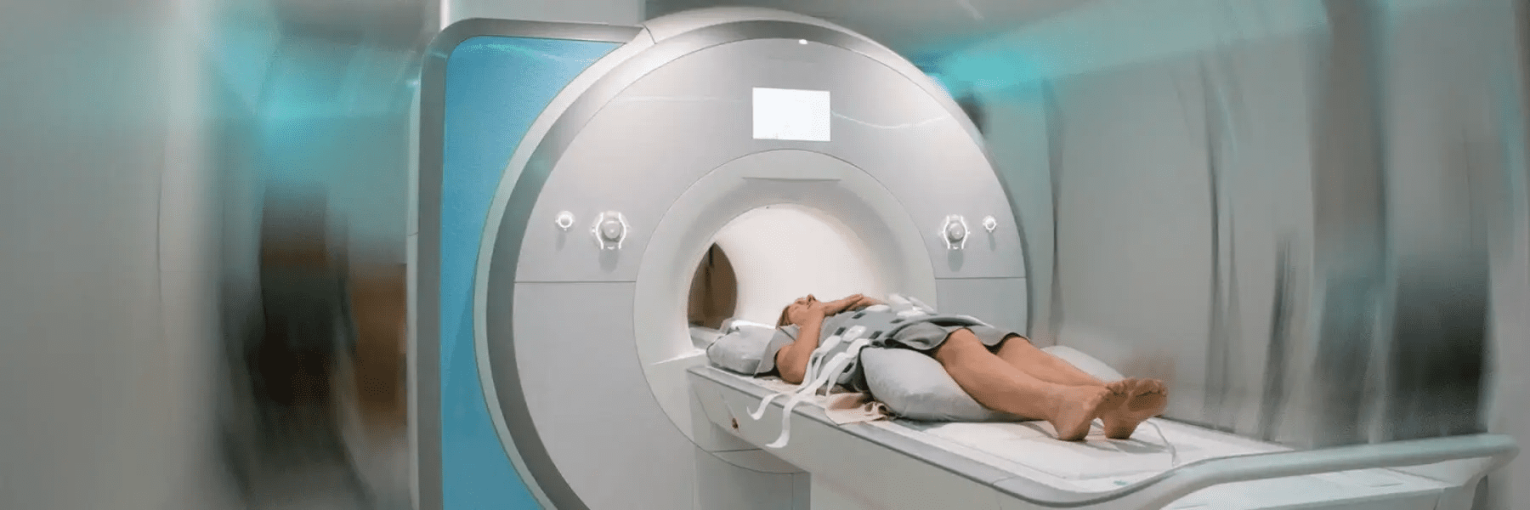We use the latest Magnetic Resonance Imaging (MRI) technology at our centres, with excellent image quality and a patient-friendly, wide bore gantry to accommodate obese patients. The total duration of the scan is less than 10 mins, thus reducing the patient’s anxiety.
Our latest acquisition is a complete MR system – the Ingenia 3.0 Tesla MRI. It is capable of performing the routine tests of the brain, spine and musculoskeletal system and even the more advanced tests like MR Spectroscopy, MR Diffusion, MR Functional Imaging, MR Angiography, MR Tractography of Brain & Spinal Cord, MR Neurography, 3T Foetal MRI, Cardiac MRI, MR lymphangiography etc.
MRI or Magnetic Resonance Imaging is a type of scan where a powerful magnetic field and radio waves are created, in order to produce detailed images of the insides of an individual’s body. The MRI is a big tube-like structure, which accommodates strong magnets. During your MRI scan, you lie down inside the tube. This advanced scan can be used to examine various parts of the body, which includes;
- Brain
- Spinal cord
- Bones and joints
- Breasts
- Heart and Blood Vessels
- Other internal organs, like the prostate gland, uterus, liver, etc.
With the help of the images and results produced by the MRI scan, the conditions can be accurately diagnosed. This leads to proper planning and execution of the treatments.
How to prepare for an MRI scan?
Before your scan, you can eat and drink normally, and take any prescribed medicine like you normally would. However, if your doctor has asked you to follow a set of instructions, then do accordingly. Once you reach the diagnostic centre, you will be asked to wear a hospital gown and remove anything, which may interfere with the magnetic imaging, such as hearing aids, dentures, wigs, watches, eyeglasses, hairpins and jewellery.
Why is an MRI scan performed?
MRI is a non-invasive method, with the help of which your doctor can take a look at your internal organs, tissues, and even the skeletal system. Since the scan produces high-quality images, it helps with an accurate diagnosis.
What happens during the MRI scan?
During your scan, you lie down on a flatbed, which then moves inside the tube-like structure, which is the scan. It depends on which body part to be examined, thus accordingly, you will move into the scanner either head first or feet first.
A radiographer is someone who has attained special training in conducting the imaging investigations, and he is the one who will be performing your MRI. The scanner is controlled with the help of a computer present in another room, in order to keep it away from the magnetic field.
To talk to your radiographer, an intercom will be present, and they will be able to see you with the help of a television monitor.
Once you are inside the tube and the scanning process has begun, you will hear loud tapping noises. This occurs due to the electric current of the scanner coils getting turned on and off. For this, you may be provided with a set of headphones or earphones.
During your scan, you must lie still for 15-90 minutes. The timing of your scan depends on the part of the body that is being scanned.
Is an MRI scan safe?
MRI is a safe and also a painless procedure. You may find it difficult or even uncomfortable if you are suffering from claustrophobia, but it can be managed as your radiographer will be present to walk you through the process and support you.
The MRI scan is not recommended in some cases, for example, if you have a metal implant, such as an artificial joint, a pacemaker, etc.
Various research has been carried out to check if the magnetic field and the radio waves are in any way harmful to the human body and no evidence has been found to suggest any harm. In fact, MRI is one of the safest medical procedures.
Why Vijaya Diagnostic Centre?
Vijaya Diagnostic Centre is proud to be the only MRI facility providing the option of high-resolution and high-field imaging. Our 3 Tesla MRI offers ultra-high-resolution imaging by incorporating technology that combines outstanding image quality with a patient-friendly short bore gantry, to eliminate claustrophobia and a dual gradient system. Some of the advanced applications offered by the Achieva 3.0T include MR Diffusion and MR Perfusion imaging, High-Resolution MR Angiography, Fiber Trak, 4D THRIVE, DWIBS for Oncology application, and Multi-Voxel Spectroscopy.
MRI Scan Centre
To find MRI Scan centre near me click here.




